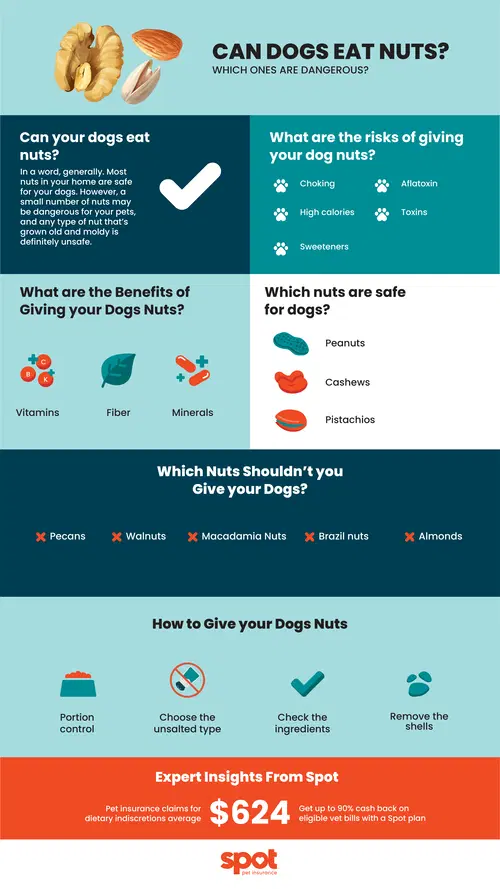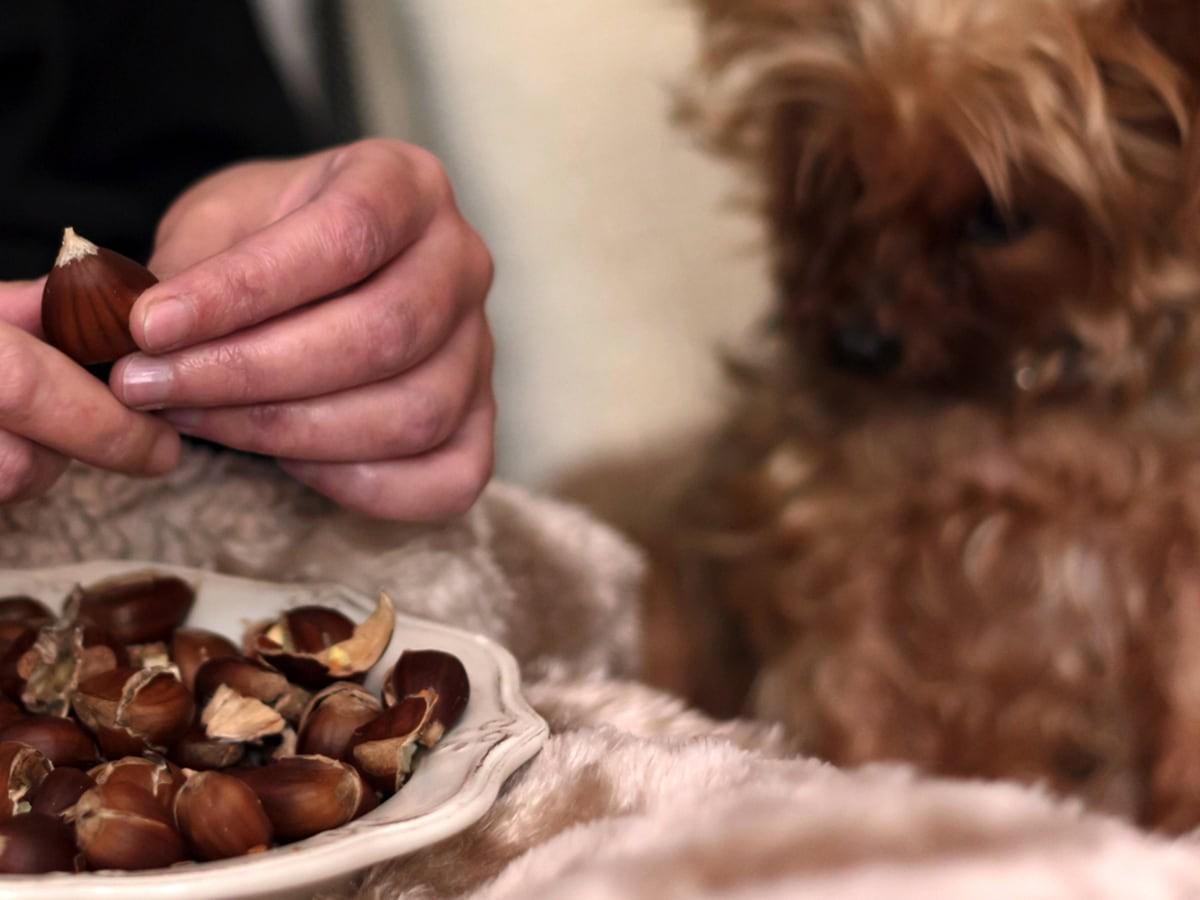There are always ideas for snacks that your dogs can enjoy, and nuts may seem like a great option. They are crunchy and tasty — two features snacking dogs tend to love.
However, not all nuts are created equal, and dogs may respond differently to each type of nut. Fortunately, Spot Pet is here to help you analyze popular nuts so you know which ones your dogs can eat.
Can your dogs eat nuts?
In a word, generally. Many nuts in your home can be safe for your dogs. However, a small number of nuts may be dangerous for your pets, and any type of nut that’s grown old and moldy is definitely unsafe.
Below, we’ll help you evaluate the potential risks and benefits of giving nuts to your dogs.

What are the benefits of giving your dogs nuts?
Fiber
Nuts contain fiber that helps digestion progress smoothly and keeps things moving along your dog’s gut.
Vitamins
Nuts can be a great vitamin source for your dogs. They provide vitamin B to help your dog utilize energy from food and to support normal cell functions.
Your dogs may also get immune system support from the vitamin C — which helps maintain the collagen in bones and muscles — that’s present in nuts.
Minerals
Minerals such as potassium, copper, and iron are another valuable nutritional benefit of nuts. These minerals help your dogs in many ways, including producing blood cells and strengthening immunity, heart function, and electrolyte balance.
What are the risks of giving your dog nuts?
Despite their healthy profile, nuts also pose some risks for pups. Here are a few facts to help you evaluate the risks before giving nuts to your dogs.
Choking
Young dogs don’t have molars for grinding, and puppies have a higher risk of choking on nuts if they swallow them whole.
Worst-case scenario, a nut could block your dog’s airway and require immediate medical attention. If it’s a more complicated situation, your dog may need surgery on their windpipe.
High calories
Nuts are calorie-dense and contain lots of fat. Although nuts can be a solid source of good fats, which your dogs need, eating too many can affect their health.
Some health conditions may also be worsened by eating lots of high-fat food, so make sure to clear it with your vet before adding nuts to your dog’s diet.
Sweeteners
Peanut butter may be a tasty snack for dogs, but you have to be very careful with its ingredients. Xylitol is a popular sweetener used in peanut butter, and it’s toxic for your dogs — even in small amounts. You should contact your emergency vet immediately if your dogs have ingested xylitol-containing peanut butter.
Aflatoxin
Fungi that may be present in nuts like peanuts produce aflatoxin that’s toxic to dogs. Contaminated peanut butter and moldy nuts can both cause aflatoxin poisoning, which in turn can lead to chronic liver disease.
To avoid this problem, make sure to inspect all the food you’re giving to your dog — and choose a major peanut butter manufacturer to make sure their product has undergone rigorous testing for aflatoxin.
Toxins
Not all nuts are great for dogs, and several contain compounds that are terrible for canines. These kinds of nuts may cause such a severe response that dogs need urgent medical care.
Other nuts may be safe in small quantities but will be toxic or cause stomach discomfort in large quantities. But don’t stress! We’ll go over the safe and unsafe kinds of nuts below.
Which nuts are safe for dogs?
Peanuts
Technically, peanuts are legumes. A popular dog snack choice, they don’t usually contain toxins unless contaminated.
However, make sure you remove the peanut shells before giving them to your pet — and choose a major brand with all-natural ingredients to avoid dangerous artificial sweeteners and preservatives.
Cashews
Cashews contain good monounsaturated fats, and they may provide additional nutrients that support your dog’s immune system. Just make sure to choose cashews that aren’t salted or seasoned; your dogs don’t need all that excess salt in their diets.
Pistachios
You can share a few pistachios since they’re a great source of vitamin B6, fiber, and potassium. However, never give your dog pistachios with the shell. They are difficult to digest, and smaller dogs may even experience a bowel obstruction from eating pistachio shells.
Which nuts shouldn’t you give your dogs?
Unlike peanuts, pistachios, and cashews, some nuts may cause negative health complications. If your dogs react adversely to any of the nuts listed below, contact your vet.
Pecans
Generally, eating a few pecans isn’t harmful to dogs. However, they’re prone to growing mold that produces dangerous toxins. Consuming moldy pecans may lead to life-threatening complications, with early warning signs including vomiting and diarrhea.
Walnuts
Walnuts are bad for dogs because they’re susceptible to toxic mold. Additionally, black walnuts contain juglone, a toxin that can make dogs quite sick.
Walnuts are also large enough to be a choking hazard, and eating lots of them may block your dog’s intestines. This is a nut that you’ll want to keep your dogs away from!
Macadamia nuts
Macadamia nuts are extremely toxic to dogs. They’re also super high in fat, which may cause inflammation of your dog’s pancreas.
Even small amounts of macadamia nuts can give your dogs unpleasant symptoms such as vomiting, muscle weakness, and diarrhea. Your vet can help you manage these unpleasant symptoms, but it’s better to make sure your dog doesn’t eat any macadamia nuts to begin with.
Brazil nuts
Your dogs may have no problem if they eat only little Brazil nuts. However, they’re so large that they present a big choking hazard, and they have such a high-fat content that they increase the risk of pancreatitis. Mold toxins are another potential risk your dog faces if they eat Brazil nuts.
Almonds
Although almonds aren’t technically toxic, they’re not great for dogs. Having more than a few almonds gives dogs unpleasant symptoms like:
Gas
Lethargy
Diarrhea
General discomfort
Due to their size and high fat content, almonds may also cause puppies to choke and older dogs to experience inflammation of the pancreas.
How to give your dogs nuts
Once you’ve chosen the right kind of nuts and checked for mold, there are a few other pointers to keep in mind.
Portion control
Most nuts have a high amount of fat. Eating too many can give your dogs excess calories and increase the risk of health problems. For that reason, you’ll want to store your nuts away from your dog’s reach. This prevents them from eating more nuts than they should.
Choose the unsalted type
Salted nuts are delicious, but your dogs don’t need all that sodium. Choose the unsalted versions of nuts as a snack for your dogs.
Check the ingredients
Many commercial nut products contain ingredients that are terrible for dogs. Check the label for toxic ingredients such as xylitol, garlic, onions, and chocolate. Dogs can get extremely sick from eating foods that contain those ingredients, so it’s best to avoid them altogether.
Remove the shells
Remove the shells and shell fragments from nuts before giving them to your dogs. Your dog’s gut doesn’t break them down, which can lead to a bowel obstruction. Additionally, dogs can choke on a shell fragment.
How many nuts should your dogs eat?
As a general rule of thumb, dogs should not consume nuts daily, since they contain more calories than your dogs need. Excessive calorie intake is a risk factor for many health conditions, especially for smaller dogs such as the Corgi.
Nuts’ high fat content also puts dogs at higher risk for a dangerous and painful health condition called pancreatitis: swelling and inflammation of the pancreas.
Serving only moderate amounts of nuts — and not making them a daily snack — helps your dogs enjoy them safely.
Expert Insights From Spot
While sharing our favorite foods with our pets can be tempting, it's important to remember that not all human foods are safe for our dogs. Spot's internal data shows that pet insurance claims for dietary indiscretions average $642*, highlighting the importance of caution and research before sharing snacks with your pet.
Conclusion
When consumed in moderation, nuts are often a safe and yummy snack for dogs. However, dogs shouldn’t eat them excessively since they’re high in calories and fat.
You also need to be sure to choose the right kind of nuts, remove the shells, and inspect them for mold. Instead of products containing dangerous additives, artificial sweeteners, or even excess salt, opt for all-natural unsalted nut products.
Lastly, not all nuts are safe for dogs, and macadamia nuts are quite dangerous. You may also want to cut out pecans, Brazil nuts, walnuts, and almonds from your dog’s diet because the risks outweigh the benefits.
For other questions about what your canine friend can and can’t eat — or for advice on caring for your dog in general — Spot Pet Insurance is your go-to guide.
What Your Dog Can Eat As Well
There’s no shame in wanting to give our dogs whatever food will make them happy. There just happens to be many other choices out there that are much healthier and more nutritious than pretzels. Here is a list of all the junk foods that your dog can eat.
Fruits
There are many fruits that dogs can eat which are packed with vitamins, dietary fibers, and antioxidants. The best are berries like strawberries, blueberries, cranberries, and raspberries. Dogs can eat bananas, oranges, apples, melons, mangos, and pineapples. Make sure fruits with pits, stems, cores, and seeds have been ridden from these items. Several of them are choking hazards and peach pits can be toxic. Grapes of any kind are poisonous to dogs, and even raisins shouldn’t be given to them.
Seafood
When seafood is free from shells, tails, bones, and legs, they are safe for a dog to eat. Dogs can have lobster, shrimp, salmon, crab, tuna, flounder, and a variety of other fish that is lower in mercury. Fish with too much mercury fed too often to our dogs can cause mercury poisoning. Uncooked or undercooked seafood can contain harmful pathogens and bacterium like salmonella which can make a dog extremely ill. Always ensure that seafood is thoroughly cooked before feeding it to your dog.
Beans
Beans can be great sources of dietary fibers and proteins which are necessary for a dog’s health. Dogs can have a wide variety of beans, including lima beans, pinto beans, black beans, garbanzo beans, soybeans, butter beans, kidney beans, navy beans, and even green beans. Beans should always be cooked thoroughly and fed to dogs in moderation to avoid tummy aches. Beans shouldn’t replace meat in a dog’s diet, since the meat they eat is a richer source of proteins.
Vegetables
As stated earlier, garlic and onions contain toxins that are bad for dogs, and even seasonings containing traces of these vegetables could cause problems. Avocado is another poisonous food because it contains a toxic chemical called persin. Other veggies are considered great sources of fiber and vitamins for dogs. Dogs can eat carrots, pumpkins, spinach, celery, brussels sprouts, broccoli, kale, and many other vegetables instead.
Nuts
Most nuts aren’t toxic to dogs, save for walnuts and macadamia nuts. Other nuts aren’t necessarily poisonous, but they can contain lots of salts, fats, and proteins that are difficult to digest. They also aren’t very practical because they can be choking hazards due to their shapes, sizes, and shells. Cashews, almonds, and pistachios are fine for dogs to eat moderately, especially when they are made into butter which is safer to eat in terms of obstruction.

I've had the privilege of immersing myself in the realm of pet safety. As the owner of an energetic mini golden doodle, I know just how stressful being a pet owner can be. I am dedicated to ensuring our beloved pets enjoy a life brimming with good health.
*Jan 2019 to Aug 2024 administrator claims data.
“Animal Poison Control Alert: Macadamia Nuts Are Toxic to Dogs.” ASPCA, www.aspca.org/news/animal-poison-control-alert-macadamia-nuts-are-toxic-dogs.
Burke, Anna. “Can Dogs Eat Almonds? Are Almonds Bad for Dogs?” American Kennel Club, American Kennel Club, 26 July 2022, www.akc.org/expert-advice/nutrition/can-dogs-eat-almonds.
The information presented in this article is for educational and informational purposes only and does not constitute or substitute for the advice of your veterinarian.












